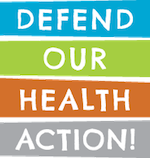Defend Our Health Organizes Advocates in Support of LD 1645
Yesterday, Defend joined legislators, constituents, and health activists as they testified in support of LD 1645 “An Act to Reduce Plastic Packaging Waste” introduced by Rep. Lori Gramlich.
The day began with a press conference held by Defend, as reported by WABI 5 News. During the press conference, executive director, Mike Belliveau, urged that swift action be taken on the issue of reducing plastic waste and how the impacts of plastic waste pollution negatively affects human health:
“Right now, our recycling stream gets contaminated by problem plastics, and that makes it more difficult to recycle, it reduces the values of the recycled material. It creates toxic byproducts that may threaten human health. So, the driving empathies for phasing out this unnecessary problematic plastic is to improve recycling and to get closer to a truly circular economy that does not have toxic byproducts along the way.”
The focus of LD 1645 is to hinder plastic pollution by abolishing PVC (vinyl), polystyrene, PET plastic, and other harmful chemicals in packaging materials while replacing them with safer alternatives that are environmentally sustainable. The bill would also make recycling plastic beverage bottles easier and more acceptable.
Below are excerpts of testimonies from activists, legislators, and constituents on LD 1645:
Rep. Lori Gramlich, Maine State Legislature: “Maine has been a true leader on these issues surrounding plastics and packaging. LD 1645 is a continuation of this good work. It will codify language from the US Plastics Pact and require industries to keep their promise of moving away from unnecessary and problematic packaging. Currently over 850 corporations, nonprofits, and local governments agree that it’s time to move away from using single plastic packaging that is not recyclable, compostable, or reusable.”
Sarah Woodbury, Director of Advocacy, Defend Our Health: “LD 1645 will phase out some of the most problematic plastic packaging. This is packaging that is not reusable, compostable, or recyclable. This [the packaging] includes polystyrene plastic, PVC plastic, and other types of plastic known to impair the quality of recycled plastics as well as cancer causing additives in PET plastics. Plastic packaging that is not recyclable or compostable adds to the waste stream and interferes with recycling efforts. Toxic additives like cobalt and antimony leech into some of the plastic packaging polluting the environment and exposing consumers to cancer causing chemicals.”
Ania Wright, Legislative and Political Specialist, Sierra Club Maine: “Based on projections from the World Energy Council, if plastics production and incineration increase as expected, greenhouse gas emissions will increase to 49 million metric tons by 2030 and 91 million metric tons by 20504. We must act to regulate plastics at all levels—from production, to transportation, to use, to disposal. The era of single-use plastics in our everyday lives is one that needs to be relegated to the past—and quickly.”
Emily Wong, Environmental Policy and Economics Student, Colby College: “PVC plastics’ lack of recyclability due to its high levels of chlorine may contribute to our plastic waste issue. Where does this plastic end up? Landfills and incinerators – including those in Maine where Massachusetts ships their waste to. Historically, Maine’s waste sites have previously been or are currently located in low-income communities. Since the plastic waste at these sites releases toxic chemicals into the soil and air, these communities are disproportionately struck with health issues.”
William ‘Buck’ O’Herin, Constituent, Montville: “Here in Maine, I have collected plastic bottles on the roadsides near my home in the Sheepscot River headwaters in Montville. Without intervention the destination of that plastic trash is Penobscot Bay and eventually the food chain. By passing LD 1645 we have the opportunity to make an important difference for the lives of our children and grandchildren, and for many species of wildlife that are negatively impacted. There are other materials options that can replace single-use plastics, that don’t pose threats to our health and won’t detract from our standard of living. We all benefit by reducing plastic waste in our environment.”
View the full press conference here: https://www.youtube.com/watch?v=m0Dh8J7GHEs
